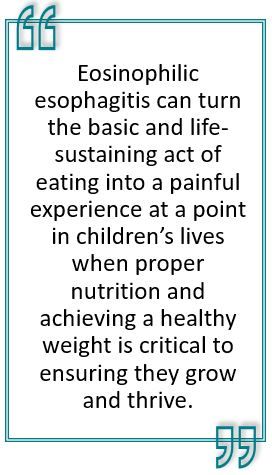Pediatric EoE: FDA Accepts Dupilumab sBLA for Priority Review in Children Younger than 12 Years
Dupilumab, a monoclonal antibody targeting type 2 inflammation, would be the first treatment of its kind for younger children with eosinophilic esophagitis.
A supplemental Biologics License Application (sBLA) for dupilumab (Dupixent) for the treatment of children from ages 1 to 11 with eosinophilic esophagitis (EoE) was accepted by the FDA for priority review this week, according to an announcement by dupilumab developers Regeneron and Sanofi on Wednesday.1
©Araki Illustrations/stock.adobe.com

The FDA has set a target action date of January 31, 2024.
If the sBLA is approved, dupilumab would be the first treatment in the US indicated for children younger than age 12 years who have EoE. Current estimates are that approximately 21 000 children younger than 12 years of age are treated for EoE in the US. If approved, dupilumab would provide a valuable, alternative option for those in this age range whose disease is not as well managed by other forms of treatment.1
EoE is linked to type 2 inflammation that affects esophageal function; it is chronic and worsens over time. As symptoms progress, EoE can drastically alter eating habits. Children can experience issues with heart burn, swallowing, vomiting, abdominal discomfort, and will often refuse food. Dupilumab works by inhibiting signals within the interleukin (IL)-4 and IL-13 pathways, the primary progenitors of type 2 inflammation .
The sBLA is supported by parts A and B of the phase 3 EoE KIDS trial (NCT04394351), in which children between the ages of 1 and 11 years were split into three groups and administered either a lower dose of dupilumab, a higher dose, or placebo. More than 50% of children demonstrated significant histologic disease remission at 16 weeks.2
Results from the higher dose group also indicated:
- An 86% reduced peak esophageal intraepithelial eosinophil level compared with their baseline vs a 21% increase in the placebo group (P = .001).
- Reductions in disease severity and extent of 0.88 and 0.84 from baseline vs 0.02 and 0.05 in the placebo group (P = .001).
- A reduction in abnormal endoscopic findings of 3.5 points from baseline vs a 0.3-point increase for the placebo group.

“The efficacy of [dupilumab] demonstrates that, in this age group, as in adults, IL-4 and IL-13 are key drivers of the type 2 inflammation underlying this debilitating disease. Eosinophilic esophagitis can turn the basic and life-sustaining act of eating into a painful experience at a point in children’s lives when proper nutrition and achieving a healthy weight is critical to ensuring they grow and thrive," George D Yancopoulos, MD, PhD, president and chief scientific officer at Regeneron, stated in a 2022 press statement.2 "The positive results from this Phase 3 pediatric trial show [dupilumab] has the potential to improve signs of eosinophilic esophagitis and support healthy weight gain in children from their first birthday.”2
Dupilumab is already FDA approved for the treatment of adult patients with moderate-to-severe atopic dermatitis whose disease is not adequately controlled with topical prescription therapies or when the use of such therapies is not recommended.3 Ongoing studies are assessing dupilumab in a wider range of diseases driven by type 2 inflammation or other allergic processes.1
References
1. Dupixent (dupilumab) sBLA for treatment of eosinophilic esophagitis in children aged 1 to 11 accepted for priority review. News release. Sanofi. September 26, 2023. Accessed September 27, 2023. https://www.news.sanofi.us/2023-09-26-Dupixent-R-dupilumab-sBLA-for-treatment-of-eosinophilic-esophagitis-in-children-aged-1-to-11-accepted-for-Priority-Review
2. Dupixent (dupilumab) phase 3 trial shows positive results in children 1 to 11 years of age with eosinophilic esophagitis. Press release. Sanofi. July 14, 2022. Accessed September 27, 2023. https://www.sanofi.com/en/media-room/press-releases/2022/2022-07-14-05-00-00-2479427
3. Dupixent (dupilumab). Prescribing information. Regeneron; 2022. Accessed September 28, 2023. https://www.regeneron.com/downloads/dupixent_fpi.pdf
Newsletter
Enhance your clinical practice with the Patient Care newsletter, offering the latest evidence-based guidelines, diagnostic insights, and treatment strategies for primary care physicians.
Clinical Tips for Using Antibiotics and Corticosteroids in IBD
January 5th 2013The goals of therapy for patients with inflammatory bowel disorder include inducing and maintaining a steroid-free remission, preventing and treating the complications of the disease, minimizing treatment toxicity, achieving mucosal healing, and enhancing quality of life.